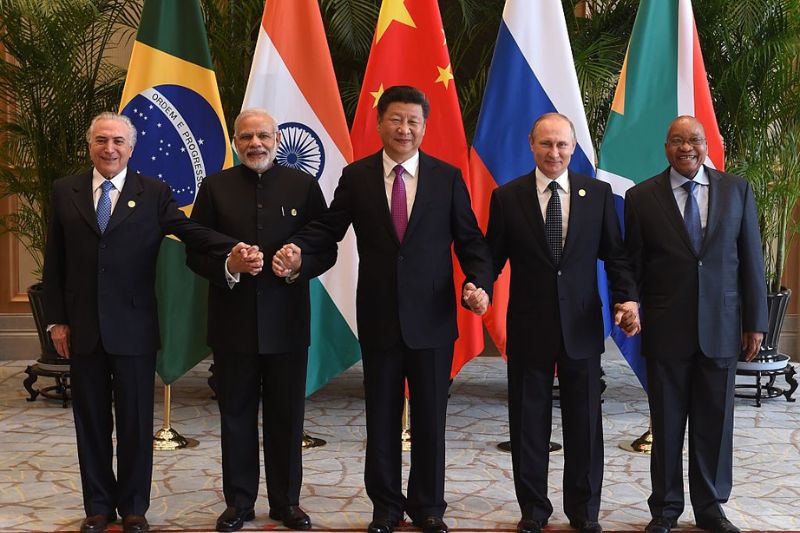In the 1990s, there was a fierce debate about the direction of geopolitics, trade and economics in the wake of the fall of the Berlin Wall. It was agreed, at least by the winners of the Cold War, that the West, headed by the United States, would rule supreme. The analyst Charles Krauthammer described it as America’s ‘unipolar moment’. Few noticed that the second word in that phrase suggested any hegemony would be transient.

The political scientist Francis Fukuyama underscored the sense of triumph with his book The End of History and the Last Man, which argued that liberal democracy would become the final form of government for all nations. This proposition came to be considered axiomatic; it was assumed that a market-based economy, combined with Western-style institutions would dominate the globe.
There were dissenting voices, though. One was Samuel Huntington, who wrote The Clash of Civilisations and the Remaking of World Order in which he argued that the primary conflicts would be defined by culture and religions. He identified nine such civilisations: Western, Eastern Orthodox, Islamic, Buddhist, Hindu, African, Latin American, Chinese (Sinic) and Japanese.
Huntington contended that with the end of the Cold War world politics would move into a new phase, in which non-Western civilizations would no longer be the exploited recipients of Western civilization but rather join the West to shape and move world history.
For the next three decades it seemed that Fukuyama would win the argument, despite the spectacular rise of China. This writer witnessed many Western business people confidently telling senior Chinese people (in China) that, as they improved their economy, they would inevitably become more democratic – see the error of their ways. Those business people failed to notice that the Chinese not only failed to agree, they did not even respond. The country had no history of democracy and was never going to do something so culturally foreign. Yet Westerners were so confident they were at the end of history they just assumed all other nations would seek to become like them.
Now, it looks like Huntington’s argument will prove to be closer to the truth. The unipolar moment probably came to an end when the United States removed the rouble from the foreign exchange system (SWIFT) thinking it would cripple Russian economy. It did not. Russia was able to find trading partners to transact in its own currency – something that bizarrely caught the Americans by surprise – and it was already mostly self sufficient due to previous rounds of sanctions.
'Australia needs to reduce its dependence on the United States and become both better at looking after itself and understanding what is happening beyond the West. The locus of power in the world has shifted and there will be no going back.'
That sent an important signal to non-Western countries, and has triggered an expansion of the so-called BRICS alliance. Brazil, Russia, India, China and South Africa are set to be joined by Egypt, Ethiopia, Saudi Arabia, the United Arab Emirates, Iran and, eventually, Argentina. When those six are added it equates with 37 per cent of world output (as defined by purchasing power). The G7 nations’ share is only 30 per cent.
Worse, Europe is facing a grim future after Germany, the lynchpin of the European Union, lost access to cheap Russian gas, deeply damaging its industry base. So the G7’s share of the world economy is likely to shrink further.
The new BRICS countries are working on a new international payments system to bypass SWIFT, which is a healthy development given that more than 98 per cent of the turnover in the SWIFT system is risky high-tech gambles called derivatives. That will mean that the Western version of the foreign exchange markets, SWIFT, will be an absurd and perilous exercise in making money out of money while the emerging non-Western version of foreign exchange will concentrate on old fashioned things like trade, especially in tangible goods.
The globalisation of business, whereby different parts of a company’s supply chains are placed where there is cheap labour, or essential knowledge and skills, is also likely to be wound back. Russia had no choice but to adopt a nationalist economic policy, but it is likely that many other countries will take a much more nationalistic focus than before.
That is something on which Australian governments should reflect. After decades of ‘economic rationalism’, which led to the enthusiastic destruction of local manufacturing, the merits of self-sufficiency are becoming increasingly evident.
A circular term popular with Canberra bureaucrats with economics degrees – ‘comparative advantage’ – should be scrapped. It essentially says that because countries are good in certain areas they will only be good in those areas and there is no possibility they will ever excel elsewhere. Therefore, countries should do nothing because doing nothing is an excellent way of doing something (such as diversifying your industry base).
Once again, economists’ grasp of the logically absurd dressed up as insight is masterful. Comparative advantage may apply to primary resources – you either have a commodity like oil or you don’t, for example – but it should not be used for anything that involves human activity.
As we move into Huntington’s world of competing civilisations, Australia needs to reduce its dependence on the United States and become both better at looking after itself and understanding what is happening beyond the West. The locus of power in the world has shifted and there will be no going back.
David James is the managing editor of personalsuperinvestor.com.au. He has a PhD in English literature and is author of the musical comedy The Bard Bites Back, which is about Shakespeare's ghost.
Main image: Chinese President Xi Jinping takes a group photo with Indian Prime Minister Narendra Modi, Brazil's President Michel Temer,Russian President Vladimir Putin and South Africa's President Jacob Zuma on September 4, 2016 in Hangzhou, China. (Wang Zhou - Pool/Getty Images)